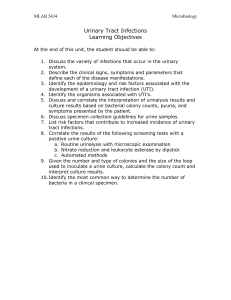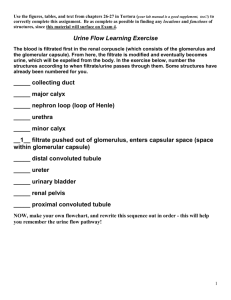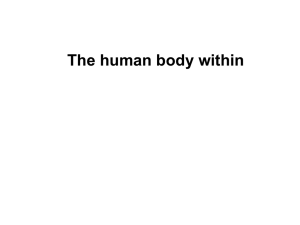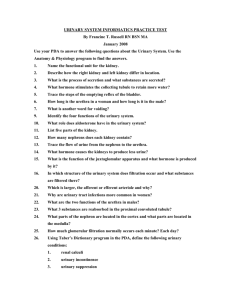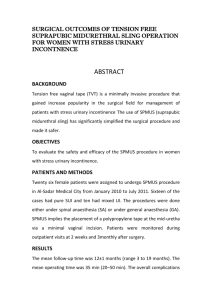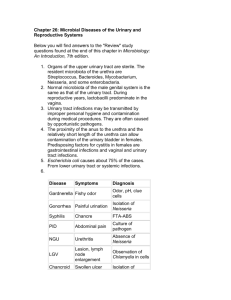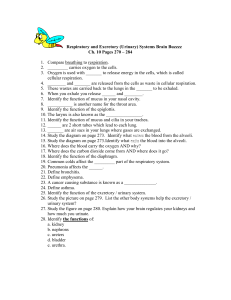4.02 Understand the functions and disorders of the urinary system
advertisement
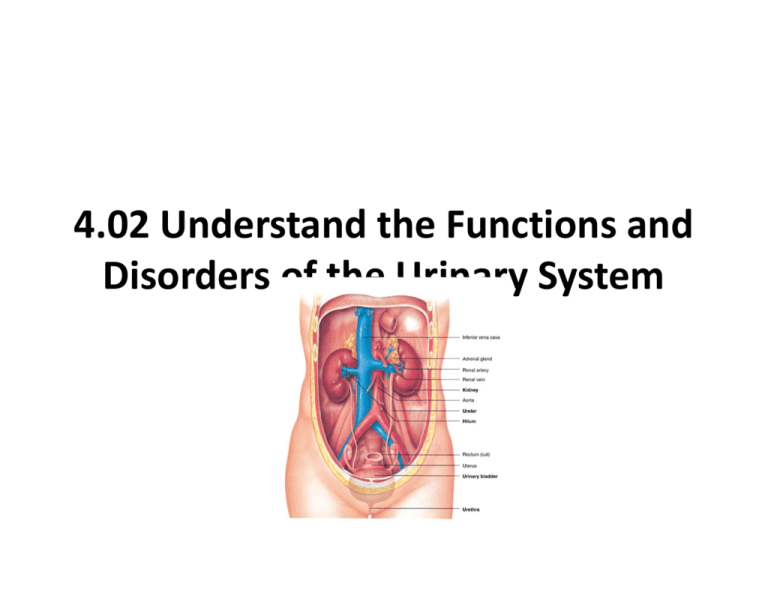
4.02 Understand the Functions and Disorders of the Urinary System 4.02 Understand the functions and disorders of the urinary system Essential Questions • What are the functions of the urinary system? • What are some disorders of the urinary system? • How are disorders of the urinary system treated? • How do you relate the body’s hormone control to the urinary system? 4.02 Understand the functions and disorders of the urinary system 2 Understand the functions of the urinary system Functions: • Filtration • Excretion • Formation of urine • Fluid and electrolyte balance • Elimination of urine 4.02 Understand the functions and disorders of the urinary system 3 4.02 Understand the functions and disorders of the urinary system • Filtration: The filtering of the blood to create a filtrate. – This is the first step in urine formation – Filtrate contains various substances – These substances are either reabsorbed back into the bloodstream, or excreted from the body as urine. 4.02 Understand the functions and disorders of the urinary system 4 Understand the functions of the urinary system Excretion • What is excretion? Removal of waste matter from the body • Why does the body have excretory functions? • What is the composition of wastes excreted by the urinary system? – Nitrogenous wastes – Salt – Water 4.02 Understand the functions and disorders of the urinary system 5 Understand the functions of the urinary system Filtration •To form urine the nephron must perform three processes: •Glomerular filtration •Tubular reabsorption •Tubular secretion Reabsorption Secretion 4.02 Understand the functions and disorders of the urinary system 6 • Blood from renal artery enters glomerulus • High pressure in glomerulus forces fluid into Bowman’s capsule, where it is filtered 4.02 Understand the functions and disorders of the urinary system 7 BOWMAN’S CAPSULE – A tuft of capillaries • Bowman’s capsule filters out 125cc of fluid/min. …how many cc’s per hour is this? • As the filtrate continues through the tubules, 99% of water is reabsorbed back into the blood stream 4.02 Understand the functions and disorders of the urinary system 8 Reabsorption • What substances are reabsorbed? – – – – – – – • • Water Glucose Amino acids Vitamins Bicarbonate ions Sodium Potassium If blood levels of certain substances are high, the substances will not be reabsorbed. Threshold: the term used to describe the limit of reabsorption 4.02 Understand the functions and disorders of the urinary system 9 Secretion •What is secretion? •The transport of substances from the blood into the urine in the distal and collecting tubules. •It is the opposite of absorption. 4.02 Understand the functions and disorders of the urinary system 10 • What substances are secreted into the collecting tubules? – – – – – Some medications Ammonia Creatinine Hydrogen ions potassium 4.02 Understand the functions and disorders of the urinary system 11 Understand the functions of the urinary system Fluid and electrolyte balance • Electrolytes are selectively secreted to maintain body’s acid-base balance. – What are electrolytes? Electrically charged particles – What do they do? Help determine fluid and acid-base balance 4.02 Understand the functions and disorders of the urinary system 12 Understand the functions of the urinary system Fluid and electrolyte balance Chemical control – ADH (Anti-diuretic hormone)- secreted by the posterior pituitary – gland when blood pressure decreases Aldosterone- A steroid secreted by the adrenal cortex when plasma sodium decreases or plasma potassium increases. Nervous control – Directly through the action of nerve impulses on the blood vessels leading to the kidney – Indirect nerve control is through stimulation of certain endocrine glands whose hormone secretion will control urinary secretion. 4.02 Understand the functions and disorders of the urinary system 13 Understand the functions of the urinary system Fluid and electrolyte balance Chemical control • The amount of ADH produced is related to the level of body hydration 4.02 Understand the functions and disorders of the urinary system 14 Understand the functions of the urinary system Forming more dilute urine: Define “dilute urine” • What are diuretics? • What effect do they have on the production of urine? • Give examples of substances that have diuretic effects. 4.02 Understand the functions and disorders of the urinary system 15 Understand the functions of the urinary system Fluid and electrolyte balance What effect does this cycle have on your blood pressure? 4.02 Understand the functions and disorders of the urinary system 16 Understand the functions of the urinary system The flow of electrolytes Review urine formation, electrolyte exchange, and some factors that effect urine volume. 4.02 Understand the functions and disorders of the urinary system 17 Understand the functions of the urinary system • What do you predict will happen to blood pressure when the blood volume increases? • What if blood volume decreases? 4.02 Understand the functions and disorders of the urinary system 18 Understand the functions of the urinary system • If more water is reabsorbed back into the body--what will happen to urine concentration? • (more or less concentrated?) 4.02 Understand the functions and disorders of the urinary system 19 Understand the functions of the urinary system Elimination of urine What causes the bladder to empty? –The bladder can hold about 500 ml of fluid –When it fills, the stretch triggers urination-emptying the bladder Is this a voluntary or involuntary action? What can prevent urination? Internal and external sphincters 4.02 Understand the functions and disorders of the urinary system 20 Understand the functions of the urinary system Elimination of urine Urinary output Average urinary output = 1500 ml per day *How many ounces is this? What effects the color of your urine? 4.02 Understand the functions and disorders of the urinary system 21 Urinalysis An examination of urine • What does normal urine look like? • What constitutes an abnormal urinalysis? 4.02 Understand the functions and disorders of the urinary system 22 Urinalysis 4.02 Understand the functions and disorders of the urinary system 23 Urinalysis 4.02 Understand the functions and disorders of the urinary system 24 Urinalysis 4.02 Understand the functions and disorders of the urinary system 25 Disorders of the urinary system 4.02 Understand the functions and disorders of the urinary system 26 Disorders of the urinary system Cystitis • What is cystitis (cyst= medical term for ____ +itis =___ ) – Inflammation of the mucous membrane lining of the bladder • Most common cause: E. Coli • What are the major symptoms of cystitis? – Painful urination (dysuria) – Frequent urination (polyuria) 4.02 Understand the functions and disorders of the urinary system 27 Disorders of the urinary system Cystitis • More common in females―Why ?? – The urethra is shorter in females 4.02 Understand the functions and disorders of the urinary system 28 Disorders of the urinary system Glomerulonephritis Disease which injures the glomerulus. What does this mean for my health? • When the filter is damaged, blood cells and blood proteins enter the filtrate • Removal of waste products is decreased • Electrolyte balance is abnormal • Kidney damage can occur 4.02 Understand the functions and disorders of the urinary system 29 Disorders of the urinary system Glomerulonephritis • Two types: – Acute- can occur in children after a bacterial infection, usually strep throat – Chronic- Occurs when the filtration membrane has been permanently affected. May result in kidney failure. 4.02 Understand the functions and disorders of the urinary system 30 Disorders of the urinary system Renal calculi Also known as nephrolithiasis nephro lith iasis What are renal calculi made of? –Calcium phosphate –Uric acid What are the symptoms? –Extreme pain –Nausea and vomiting –Burning when urinating –Hematuria 4.02 Understand the functions and disorders of the urinary system 31 Disorders of the urinary system Renal calculi • What will happen if the ureters are blocked? – The renal pelvis and calyces become enlarged due to excess fluid 4.02 Understand the functions and disorders of the urinary system 32 Disorders of the urinary system Renal calculi • How is it treated? – Increase fluids – Medications – Lithotripsy 4.02 Understand the functions and disorders of the urinary system 33 Disorders of the urinary system Renal calculi • How does lithotripsy work? – Shockwaves are created outside the body that travel through until the waves hit the dense stones. • Is it a cure? 4.02 Understand the functions and disorders of the urinary system 34 Disorders of the urinary system Renal failure • Acute • What causes it? – – – – – – Nephritis shock Injury Bleeding Heart failure Poisoning – What are the symptoms? • Oliguria- diminished production of urine • Anuria- absence of urine • Uremia- when the blood retains urinary waste products 4.02 Understand the functions and disorders of the urinary system 35 Disorders of the urinary system Renal failure chronic • Symptoms may be none in early stages, urinalysis may reveal proteinuria 4.02 Understand the functions and disorders of the urinary system 36 Disorders of the urinary system Renal Failure • Chronic kidney disease leads to a buildup of fluid and waste products in the body. 4.02 Understand the functions and disorders of the urinary system 37 Disorders of the urinary system Renal Failure • How is it treated? – Peritoneal dialysis • Read about it! Page 587 4.02 Understand the functions and disorders of the urinary system 38 Disorders of the urinary system Renal Failure • How is it treated? – Hemodialysis • Read about it! Page 587 4.02 Understand the functions and disorders of the urinary system 39 Disorders of the urinary system Renal Failure • Compare the treatment of acute and chronic renal failure. 4.02 Understand the functions and disorders of the urinary system 40 Disorders of the urinary system How does hemodialysis mimic glomerular function? 4.02 Understand the functions and disorders of the urinary system 41 Disorders of the urinary system Renal transplant • What is involved in this treatment option? • When does a patient get a transplant? • Read about it! Page 588 4.02 Understand the functions and disorders of the urinary system 42 Disorders of the urinary system Renal transplant What is the major complication of renal transplantation? 4.02 Understand the functions and disorders of the urinary system 43 4.02 Understand the functions and disorders of the urinary system • Essential Questions • What are the functions of the urinary system? • What are some disorders of the urinary system? • How are disorders of the urinary system treated? • How do you relate the body’s hormone control to the urinary system? 4.02 Understand the functions and disorders of the urinary system 44
